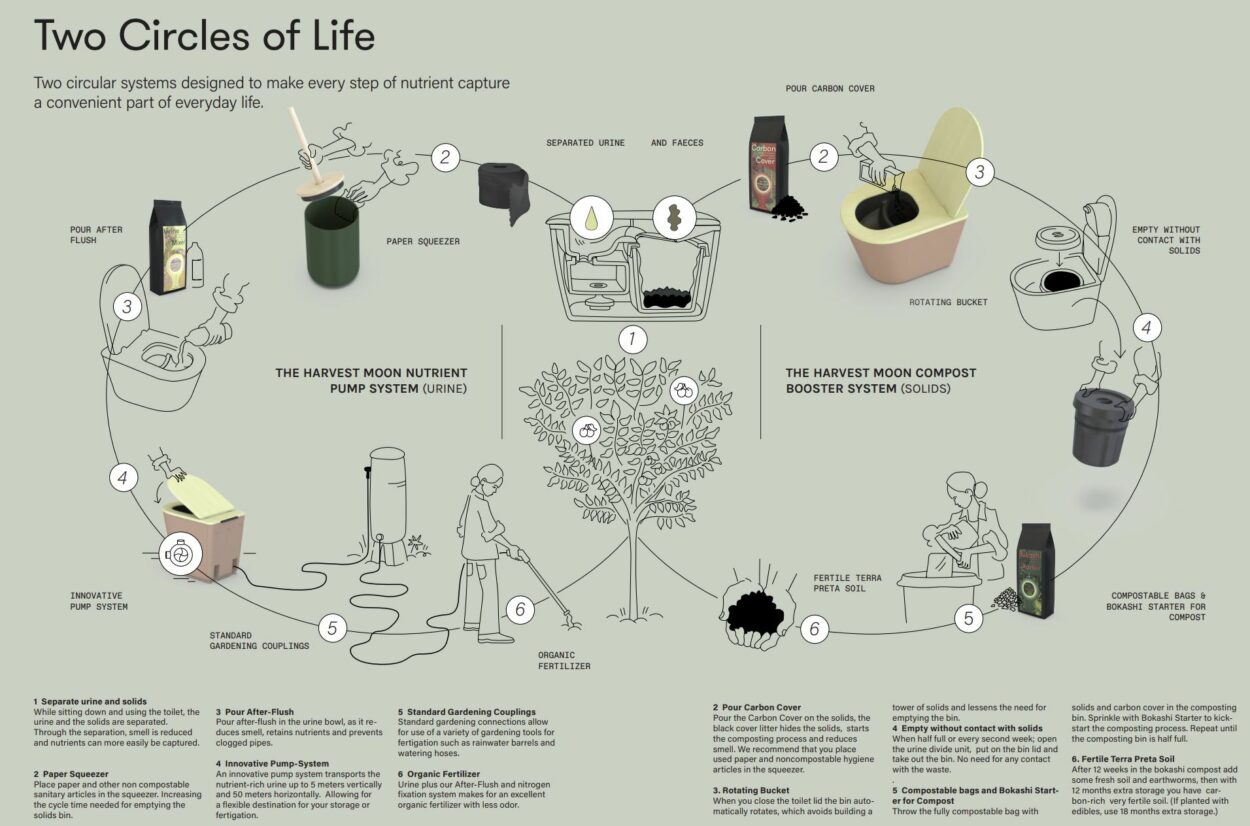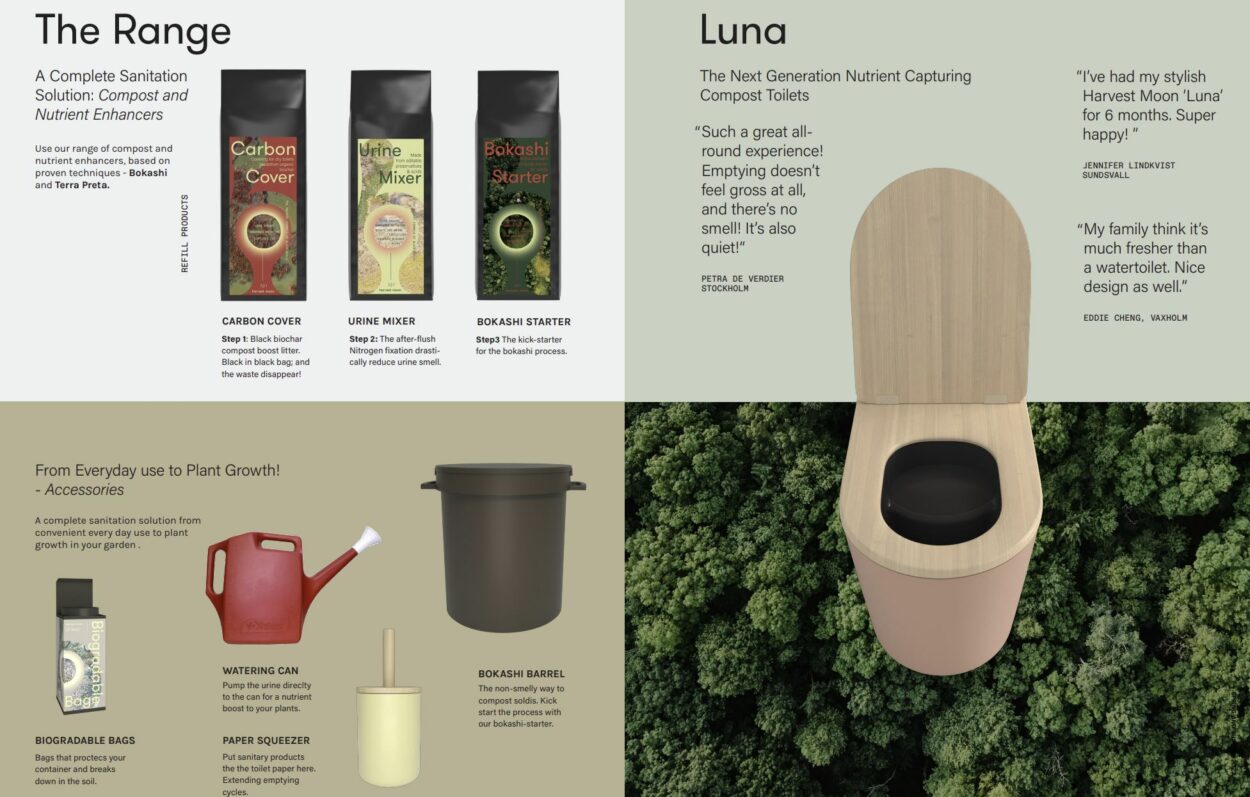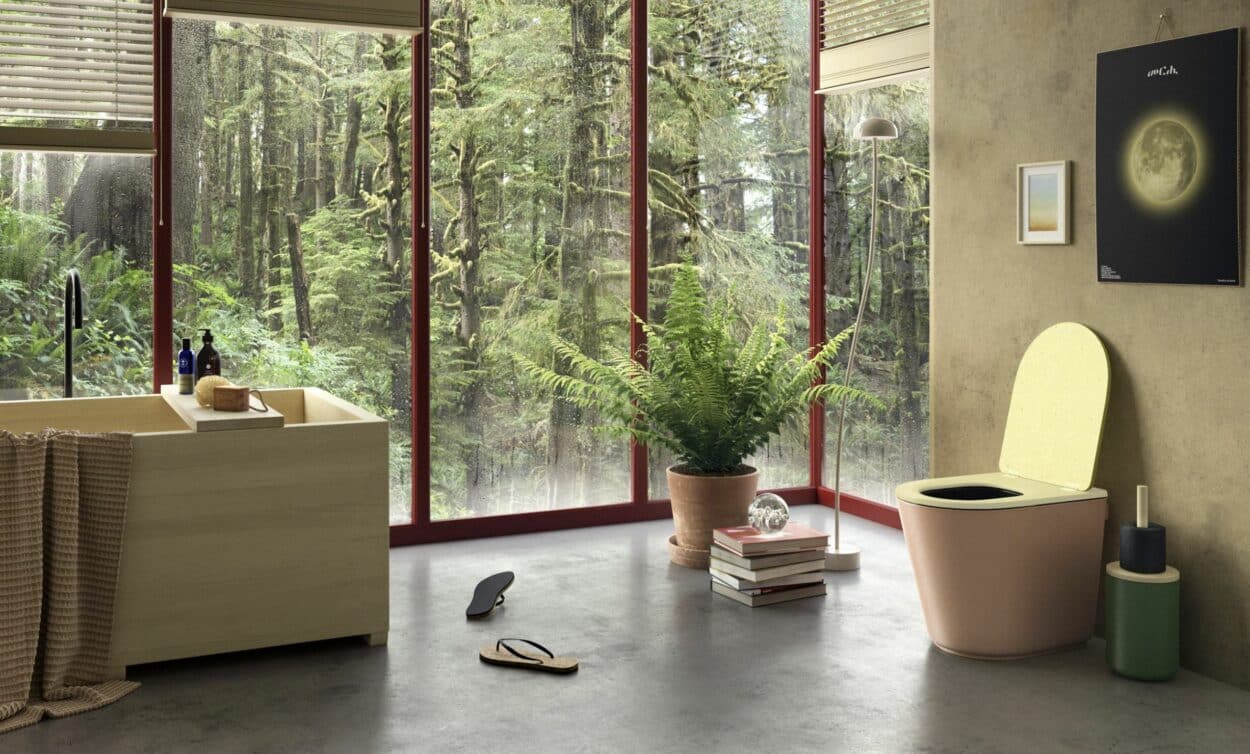Harvest Moon’s Luna compost toilet revolutionizes waste management with its waterless design, innovative composting techniques, and user-friendly features, offering a closed-loop approach to sustainability.
In a bold move towards sustainable living, Swedish bathroom brand Harvest Moon has unveiled its inaugural product, the Luna compost toilet. Unveiled at the prestigious Stockholm Furniture Fair as part of New Ventures, a section dedicated to first-time exhibitors, Luna represents a paradigm shift in waste management, offering a waterless solution that seamlessly blends eco-friendliness with elegance and comfort.
The Luna compost toilet is the culmination of five years of meticulous development, with user experience being as paramount as the toilet’s eco-friendly credentials. Harvest Moon’s mission with Luna is clear: to challenge the conventional water-based sanitation systems by offering an alternative that not only looks sleek for a bathroom with class but also saves significant amounts of water and energy.
Studies indicate that toilets contribute to approximately 27 percent of a household’s water consumption, equating to a substantial 50,000 liters annually. Nevertheless, Harvest Moon emphasizes additional advantages, notably enhanced installation flexibility and the retrieval of valuable nutrients through composting.

Separation System and Electronic Functions
At the heart of Luna’s design lies its innovative urine separation system, which diverts urine and feces into separate compartments for disposal. This feature not only eliminates the need for manual handling of waste but also allows for greater installation flexibility, as there’s no requirement for underground collection tanks or complex plumbing setups.
The Luna compost toilet offers innovative solutions for waste management, allowing for the diversion of nutrient-rich urine to outdoor fertilizer storage tanks or ground infiltration systems, contingent upon local regulations. Should neither option be feasible, a direct pump mechanism provides the flexibility to discharge urine into the sewer system, offering unparalleled placement freedom for users. Meanwhile, solid waste is collected in a discreetly designed bin with a compostable plastic bag, cleverly concealed by its black exterior.
“When you close the lid, the urine is pumped to a destination that suits your setup. It means you can place the toilet wherever you want,” Hampus Nordensson, industrial designer at Harvest Moon, explained in a press release.
The lid facilitates effortless, hands-free transfer to a composting site, where decomposition occurs over a year before the nutrient-rich compost is reintegrated into the soil. Luna’s advanced electronic features, including a sliding cover, rotating bin, and fan for optimal air circulation, ensure efficient waste decomposition. The sliding cover to keep feces covered, a rotating bin for efficient decomposition, and a fan for optimal air circulation. These features can be powered by solar electricity, making Luna suitable for off-grid use.
Harvest Moon further enhances the user experience with accessories such as the Carbon Cover and liquid Urine Mixer, effectively mitigating odors and promoting a more pleasant toilet experience.

Closed-loop Approach: Recycling Valuable Nutrients
The Luna Composting Toilet by Harvest Moon integrates cutting-edge features and innovative composting techniques to enable a closed-loop approach toward sustainability.
Luna boasts an array of user-friendly features, including an electronically controlled hatch and a rotating bin, ensuring a seamless experience for users. Moreover, the incorporation of Bokashi and Terra Preta composting methods enhances its efficiency. Bokashi, a rapid composting technique, circumvents direct handling of human waste, while Terra Preta captures and enriches solid carbon, facilitating a comprehensive circular system.
Through the Moon Cycle program, users can contribute to this vision by returning used products for refurbishment, reuse, or recycling. Additionally, the program offers subscription options for essential refills and provides access to community-based forums, promoting a collaborative approach to sustainability.
A key component of Luna’s closed-loop approach is the recycling of valuable nutrients found in human waste. Urine, rich in nitrogen, potassium, phosphorus, and other minerals, serves as an excellent fertilizer. By separating urine from solids, Luna mitigates the breakdown of nitrogen into ammonia, thus preventing foul odors. The composting of solids further removes pathogens and bacteria, rendering them safe for use as soil amendments. This process not only conserves water and energy but also prevents the contamination of waterways and reduces greenhouse gas emissions associated with traditional sanitation methods.
The utilization of nitrogen, phosphorus, and potassium (NPK) found in urine and solids presents a significant opportunity to close the nutrient cycle and reinvest in agricultural practices. Unlike artificial fertilizers, which are costly, environmentally damaging, and reliant on finite fossil resources, Luna’s organic fertilizers enrich the soil with essential macronutrients, fostering fertility and resilience in ecosystems.
In addition to its environmental benefits, Luna addresses the significant water consumption associated with conventional toilets. With a common water toilet consuming approximately six liters per flush, Luna’s waterless design not only conserves clean water but also eliminates the need for chemical-laden wastewater treatment processes, which contribute to greenhouse gas emissions and pose risks to soil health.
By embracing Luna’s closed-loop approach, individuals can play a vital role in preserving the environment, promoting agricultural sustainability, and fostering resilient communities for generations to come.











